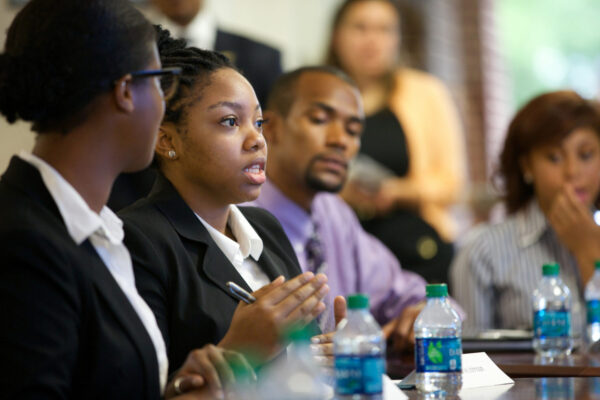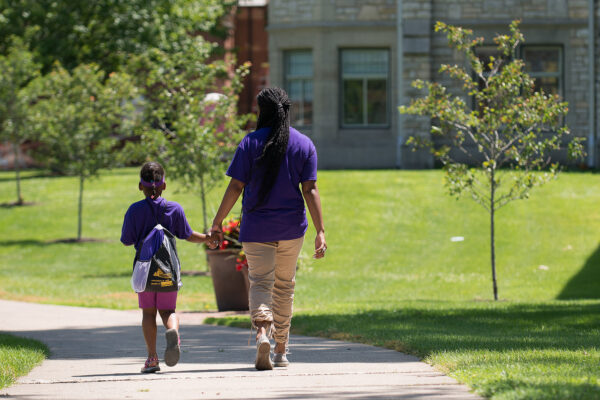The growing mental health crisis among young adults is one of the most pressing public health issues. The World Health Organization reported that approximately 20 percent of young adults will have experienced a mental health problem (mostly depression or anxiety) by 2024. For student-athletes, the stressors of the college experience can include unique demands on their time and energy. Student-athletes often play an integral role in their campus communities, balancing the rigor of academics with practice schedules, travel, and other team commitments as well as managing the pressure to perform well in their chosen sport—which often includes the expectation of perfection, either from themselves or others. Balancing the identities of student and athlete can also be challenging, as student-athletes often need to switch between these roles on a daily basis.
All students need support and aid from their institutions as they navigate their mental health. When the National Collegiate Athletic Association conducted a student-athlete well-being survey in fall 2021, however, only 55 percent of men’s sports participants and 47 percent of women’s sports participants agreed or strongly agreed that their mental health was a priority to their athletic department.
In addition, a 2022 Mantra Health and National Association for Intercollegiate Athletics study reported that 90 percent of athletic directors do not feel that their institutions offer enough training or psychiatric support services for coaches and student-athletes. Ninety-two percent indicated that their athletic departments do not have psychiatric support services available for their student-athletes but would like to provide them.
The collegiate student-athlete world comprises many players—the student-athletes themselves, campus leadership, coaches, trainers, athletic directors, other athletic department support staff, peers, and families—so no one solution will fit every situation. There are resources, however, that can support higher education leadership, coaches, and faculty in mitigating student-athlete mental health concerns.
Onboarding members of the athletic department
Two resources stand out as particularly useful for athletic department staff.
The Sport Mental Health Recognition Tool 1 was created by the International Olympic Committee (IOC) for athletes and their support circle to help identify signs of mental health problems. The purpose of this tool is not to diagnose the athlete but to help others recognize that they may be struggling and understand how to help.
Mental Health First Aid is a skills-based training course that teaches participants about mental health and substance-use issues. It enables faculty to participate in certified courses, such as regular first aid training. The Mental Health First Aid training program can focus on crisis intervention techniques, among other topics. In a campus setting, crisis intervention is vital because it provides faculty, coaches, and staff with strategies to help those student-athletes who may need access to immediate psychiatric services.
The role of the National Collegiate Athletic Association (NCAA)
NCAA player eligibility standards vary by institution and division level (I, II, and III), and they may include specific grade-point average requirements, enrollment status requirements, drug-testing programs, and sports physical examinations. Aside from academic and physical requirements and screenings, a mental health screening should be conducted with each student-athlete around the time they are required to obtain physicals with their athletic trainers. Specifically, participating in this screening should be a requirement to maintain player eligibility.
The Sport Mental Health Assessment Tool 1 is a standardized assessment tool developed by the IOC that mental health professionals and athletic staff can use at the collegiate level for student-athletes who are ages 16 and older and potentially at risk for or already experiencing mental health symptoms and disorders. The IOC recommends using this tool throughout the duration of the regular season.
Guiding faculty in communicating about mental health
Most university faculty are not medically trained mental health clinicians, but they are often personally connected with student-athletes; these relationships can be vital for student-athlete support. Faculty can use the communication strategies from the Centre for Innovation in Campus Mental Health’s (CICMH) Mental Health Communication Strategies with Athletes and The Jed Foundation’s Faculty Guide to Supporting Student Mental Health to navigate mental health issues with students.
CICMH’s Student Athlete Mental Health Toolkit and the NCAA’s Step UP! Program recommend using a five-step framework to approach a student-athlete about mental health concerns. This method encourages faculty to initiate conversations using five phrases: I care, I see, I feel, I wonder, and I will.
The Jed Foundation’s Faculty Guide to Supporting Student Mental Health provides recommendations for how to reach out to a student who may be struggling. The guide provides examples for faculty to start conversations with students who may be showing signs of mental health concerns. Although the guide was created for general faculty, this method can also be utilized for staff and coaches who work firsthand with student-athletes.
Empowering peer support
Peers—especially teammates—can be excellent resources for fellow students who are struggling with their mental health.
The NCAA recommends implementing a student-athlete mentor program as part of its Layers of Care Model. The peer-to-peer structured mentor program can be ideal for individuals who feel more comfortable seeking initial support from a fellow student-athlete with a similar experience than from a faculty member, coach, or a certified mental health clinician. Working with a student-athlete who has overcome their struggles can also inspire hope and courage.
In addition to trained athletic staff using the Sport Mental Health Recognition Tool 1, student-athletes can also use it to identify signs of mental health concerns among their peers. This excellent resource describes the types of thoughts, feelings, behaviors, and physical changes that may reveal mental health concerns in student-athletes. Similar to faculty, student-athletes are not clinically trained to identify and treat mental health disorders for themselves or their peers. Referencing this assessment, especially the flow chart, can help guide student-athletes in the right direction when they may have concerns about a peer.
Caring for those who care
People who work directly with individuals who are experiencing mental health problems are at increased risk for compassion fatigue. Athletic department personnel directly interact with student-athletes on a regular basis and may be the first to notice signs of mental health problems. This factor puts athletic department personnel at an increased risk for developing compassion fatigue, especially if they do not have the proper resources allocated for self-support.
CICMH’s Student Athlete Mental Health Toolkit provides information for coaches, athletic department staff, and other leadership to recognize student-athletes who need mental health support. An included resource, Mental Health Communication Strategies with Athletes, outlines a four-step approach called the Four Rs. The final action step of the Four Rs is to reflect on the interaction with the distressed student. CICMH recognizes the potential range of emotional responses that can occur after involvement with student-athletes who are experiencing severe stress and trauma, and it recommends practicing self-care by acknowledging the responder’s own emotional state and need to engage in wellness activities. It is recommended that mental health-care services be uniquely curated to athletic department members and set apart from the services offered to student-athletes. The services should be provided by individuals who are qualified to provide support for compassion fatigue and secondary trauma care and support.
Collegiate student-athletes—and all students—are in urgent need of improved and increased mental health resources, and these athlete-specific resources can be particularly helpful. Ultimately, the needs of higher education leadership, coaches, and faculty should be addressed to better support student-athletes and reduce severe mental health outcomes.
If you have any questions or comments about this blog post, please contact us.



